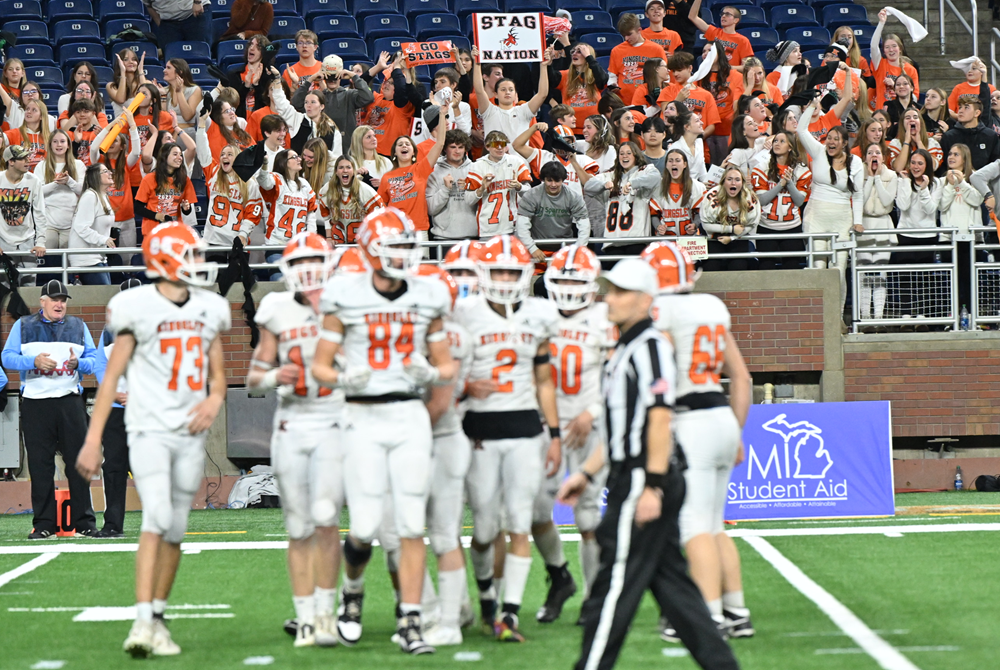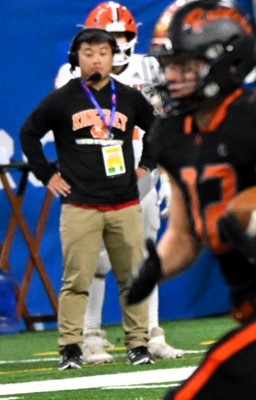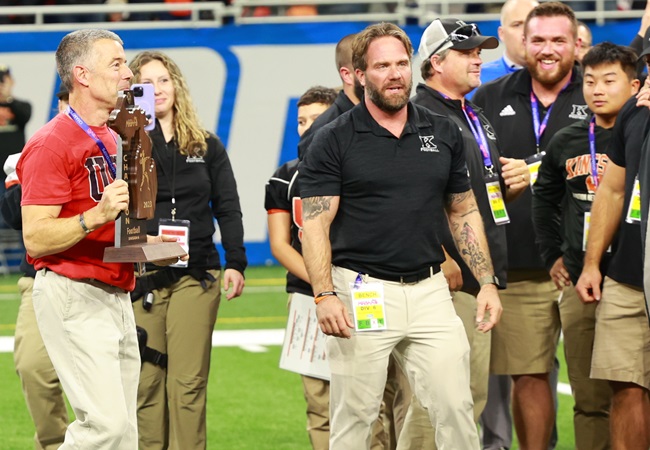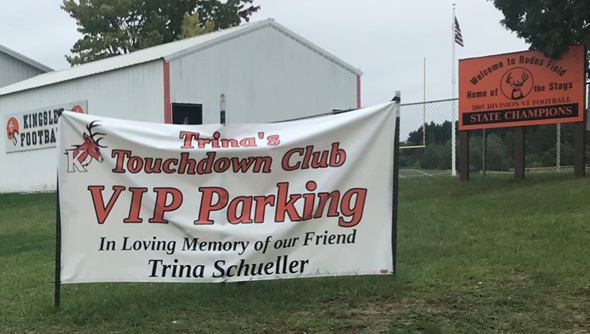
CAP Begins 2014-15 on Record Pace
By
Geoff Kimmerly
MHSAA.com senior editor
August 22, 2014
Gretchen Mohney has come to recognize coaches who think they already know it all.
Then she begins a Coaches Advancement Program lesson by describing an orange banging around inside a fishbowl – a metaphor to explain the brain inside an athlete’s skull when he or she suffers a concussion.
Her most powerful lessons have moved pupils to tears. And it’s always gratifying to witness the “Aha” moments that make the CAP educational experience so powerful.
“My favorite is when they admit that they’ve done something wrong, and they want to know how to do something better,” said Mohney, a highly-respected trainer and strength and conditioning coach who also serves as an instructor for the athletic training program at Western Michigan University. “It’s a pretty awesome moment when they realize there’s more to learn.”
More current and aspiring coaches than ever before are taking advantage of that opportunity as the 2014-15 school year kicks off.
Since this training year began July 25 at Battle Creek Lakeview, 273 current or aspiring coaches have completed CAP sessions – nearly twice as many coaches as this point a year ago and with the last session of August planned for Saturday at New Buffalo. That makes this the busiest start in CAP history, according to MHSAA assistant director Kathy Vruggink Westdorp, who joined the MHSAA staff in 2004, developed CAP for the 2004-05 school year and continues to oversee the program.
This first month’s total attendance also represents 33 percent of the 818 total CAP units completed at high schools and the MHSAA office during all of 2013-14.
“I think the big thing continues to be word of mouth that this is a quality program,” said Hamilton athletic director Jerry Haggerty, a CAP instructor for nine years. “It’s good for all coaches of all experience levels.”
Setting a standard
Since the program’s inception, nearly 6,300 coaches have completed at least the first-level unit. More than 1,000 have advanced through CAP 4.
The CAP program is broken into six levels, each addressing a set of topics:
- CAP 1: Coaches Make the Difference, The Coach as Teacher, Sports Medicine and First Aid.
- CAP 2: Effective Communication, Legal Responsibilities, Psychology of Coaching.
- CAP 3: Additional Coaching Responsibilities, Effectively Working with Parents, The Coach as Performer.
- CAP 4: Understanding Athletic Development, Strength and Conditioning, Preparing for Success.
- CAP 5: Healthy Living, Teaching Emotional Toughness, Resolving Conflicts in Athletics.
- CAP 6: Current Issues and Topics in Educational Athletics.
“Individuals who go through this have a better understanding of their philosophy, their school’s philosophy, their role and responsibility as well as the meaning behind MHSAA rules,” said Westdorp, a former principal, athletic director, teacher and coach in the Grand Rapids area who was named 2013 Coach Educator of the Year by the National Federation of State High School Associations (NFHS) for her work with the program.
She trains and evaluates all presenters and instructors, including those who last school year administered 1,238 CAP sessions at seven universities and colleges across both peninsulas.
The non-college CAP sessions are taught by 20 instructors who pride themselves on being available anywhere there’s interest. CAP has been presented at 10 Lower Peninsula schools over the last month, with Upper Peninsula sessions planned for this fall. August 9 was particularly busy – units were taught at Jonesville, Pontiac Notre Dame Prep and Riverview Gabriel Richard – but Westdorp sees the possibility of presenting at up to five sites on the same day.
Flexibility also is an option; a group of mostly non-school coaches took CAP 2 last week in Baldwin, and were able to complete the course over two days instead of one so they could do so without interrupting their fulltime jobs. For coaches working in schools, CAP units can qualify as continuing education credits with the State Department of Education.
Colleges and universities in Michigan are licensed to present up to five levels through their undergraduate or graduate studies, and the list of those who completed courses the last few years is filled with recognizable names of former high achievers on MHSAA courts and fields. Southwestern Michigan College in Dowagiac will offer courses for the first time this fall.
Certification in the program occurs after completion of CAP 1 and 2, and then after each subsequent unit, with those completing CAP 6 earning Masters Elite Certification.
The topics of CAP sessions “bleed” into each other, Mohney said, and come with plenty of first-person examples to make them relevant to coaches who then realize they aren’t alone facing issues most encounter.
“I talk to them because I’ve been there. … (I say,) ‘Now, let’s talk real.’ I place them in a real situation,” Mohney said. “’The biggest thing is you guys don’t have to know everything. You just need to coach, be aware of this, this and that. And these are some ideas to go about your plan so you can decrease your stress.’
“Any time a coach hears that, it’s a beautiful thing. Because I’m not sure what coach in high school is in coaching for the money.”
Raising the bar
Certainly, some of this month’s heightened CAP participation can be attributed to an MHSAA Representative Council action in March. Beginning Aug. 1, 2016, varsity head coaches hired for the first time at an MHSAA member school must have completed CAP 1 or CAP 2. Westdorp said some who wish to become head coaches in that near future are getting a jump by completing CAP courses now.
But that’s only a slice of the success story.
Haggerty has directed Hamilton’s athletic department for 15 years and said all of his coaches have taken either CAP 1 or 2. Many coaches take the courses on their own; others are required to do so by their athletic directors.
The Capital Area Activities Conference will offer CAP 1 three times this school year, with 100-150 coaches from their 20 member schools expected for each session. Others leagues and conferences are designing similar arrangements.
Michael Roy coached boys basketball at Lawton and girls hoops at Vicksburg and was certified under the predecessor to CAP – the MHSAA’s former Program for Athletic Coaches’ Education (PACE). He’s beginning his 13th year as Vicksburg’s athletic director, and after hosting several CAP classes over the years decided to begin the program himself this month.
“The need for knowledgeable and experienced coaches is greater than ever before. I thought if I was going to make it mandatory for my coaches to become CAP certified, that I needed to get CAP certified and lead by example,” Roy said. “The heart of any athletic team or program is its coaching staff. CAP is the surest way for coaches to access everything they need to know how to be a good coach. They learn the art of effective coaching through one of the best-designed coaches education programs in the country. CAP is second to none.”
Haggerty has spoken with athletic directors who have completed the program and then recognize when their coaches employ strategies learned at CAP sessions. An increasing pool of coaching candidates are heading into interviews with CAP certification in hand, and Westdorp has seen coaches bringing their CAP binders to practices to have those lessons available for quick reference. She’s also watched many CAP graduates using their skills at the highest level – the MHSAA Finals.
A comment by Duke men’s basketball coach Mike Krzyzewski sits at the front of those CAP binders: “A common mistake among those who work in sport is spending a disproportional amount of time on x’s and o’s as compared to time spent learning about people.”
Haggerty starts each session telling his pupils, “I do this for two reasons; one because I think it’s important to look at the non-x and o coaching realms; and two, because this is great fun for me.’”
And those coaches who come into CAP thinking they know enough? Mohney said most finish the first unit looking forward to beginning the next.
“CAP has a lot to do with understanding what you’re about, understanding your role and responsibility in athletics and your leadership role,” Westdorp said. “When I start programs, I talk about my work roles in life, and then (I tell coaches), ‘I want to tell you where I felt I was more influential, and that was as a coach.
“’And don’t ever forget it..’”
Click for more on the Coaches Advancement Program.
PHOTOS: These coaches, counter-clockwise from top left, all have completed at least one CAP unit: Bay City Western softball coach Rick Garlinghouse, St. Ignace girls basketball coach Dorene Ingalls, Ypsilanti Community boys basketball coach Steve Brooks, Beal City baseball coach Brad Antcliff and Mattawan softball coach Alicia Smith.

Football Title Reflects Kingsley's Current Success, Recalls Loved Ones Passed
By
Tom Spencer
Special for MHSAA.com
December 1, 2023
Kingsley football fans have become pretty familiar with VIP parking for home games over the last couple of seasons.
 They may just start looking for a Kingsley VIP lot at Ford Field. The Stags just captured the MHSAA Division 6 championship trophy with a 38-24 victory over Almont, their second Finals championship and first since 2005.
They may just start looking for a Kingsley VIP lot at Ford Field. The Stags just captured the MHSAA Division 6 championship trophy with a 38-24 victory over Almont, their second Finals championship and first since 2005.
The road to the Finals started with Kingsley hosting two playoff games, allowing great use of the VIP Parking of Trina’s Touchdown Club. The lot is adjacent to the school’s Rodes Field and provided in loving memory of Katrina “Trina” Kay Schueller, who passed away Oct. 21, 2021, at Munson Medical Center.
Those playoff games filling Trina’s Touchdown Club’s parking lot featured wins over Mason County Central 61-12 and Manistee 37-18, and 51-27 over Gladstone in the Regional Final. Kingsley then traveled down the road and defeated Reed City 37-7 in the Semifinal.
There may not have been designated VIP parking in Cadillac and Ford Field for the Stags’ followers, but there were a lot of VIPs at both stadiums with Schueller on their minds. Pretty much everyone with an affiliation with the highly-successful program or familiarity with the community’s struggles have become VIPs to the Kingsley coaching staff and many others.
Most certainly among the VIPs are head coach Tim Wooer, assistant coach Conner Schueller, his brother Carter Schueller, and his father Mike Schueller.
Conner was set to play the biggest regular-season game of his career the day after his mom passed. It was the regular-season finale against rival Traverse City St. Francis.
Wooer vividly remembers the moments leading up to that matchup, noting how difficult it was for Conner. But his then-fullback and now-assistant coach demonstrated amazing strength and maturity he stills exhibits today.
 “He’s in his senior football season, and his mom is in the hospital for four weeks — he’s balancing that playing football and going to school,” Wooer recalled. “And then she passes, and he has the strength to come back to school and deliver the news to our team.
“He’s in his senior football season, and his mom is in the hospital for four weeks — he’s balancing that playing football and going to school,” Wooer recalled. “And then she passes, and he has the strength to come back to school and deliver the news to our team.
“I am sobbing watching this kid, and I’m just amazed,” Wooer continued. “The next night is Parents Night, and he’s on the field with his dad and brother without his mom.”
Conner still played, making a 4th-down goal line tackle to prevent a St. Francis touchdown. The Gladiators won the game, but Conner won the day, conquering much just to dress for the game.
The Stags went on to playoff wins over Kingsford 28-10 and Clare 32-6. They bowed out with a 33-18 Regional loss to Frankenmuth.
Conner’s junior year of 2020 had been cut short as the Kingsley was forced to forfeit its District Final to Reed City because several players and coaching staff tested positive for COVID-19. The Stags had Ford Field in their minds that season too after playoff wins over 38-13 Standish-Sterling 38-13 and Gladwin 63-16.
Conner, who celebrated his 20th birthday at Saturday’s Final, remembers his playing days and the challenges presented him.
“At the time it was ‘she’s not there,’ especially my senior year she wasn’t there to watch me and finish it out, but I know she’s watching above,” he said. “We were about to go play Reed City my junior year for Regionals, and everyone got sick and it ended our season unfortunately.”
Those challenges were on his mind at Ford Field, and running through his mind when he saw his brother and father in the stands. Carter, now a senior at Kingsley, had been unable to play football due to injuries.
“I thought about my brother – he unfortunately didn’t play this year due to his injuries, and I don’t really blame him for that,” Conner said. “I thought about him as well because it was just me and my dad and my brother now.
“It was very emotional,” Conner continued. “I got a glimpse of him in the strands.”
Carter also was filled with gratitude for the coaching staff for welcoming and mentoring him. He had become keenly aware of the amount of time coaches spend away from family at practices and going through film.
In addition to his family, Conner was thinking about many others in the Kingsley community – and other senior classes like his that didn’t get the chance to celebrate a championship.
He also was thinking about Justin Hansen, a 2003 graduate of Kingsley. Hansen was a captain on the 2002 conference championship team. He went on to become a special-operations Marine sergeant and was killed in action July 24, 2012, while deployed in Afghanistan. Hansen was on patrol as part of an operation in search of a high-value target when his team was hit with small arms fire.
 On Saturday, Wooer was wearing a red T-shirt with the letters “USA” on the front and the name “Hansen” on the back. It also featured the number 54, Hansen’s in high school.
On Saturday, Wooer was wearing a red T-shirt with the letters “USA” on the front and the name “Hansen” on the back. It also featured the number 54, Hansen’s in high school.
Wooer, who turned 54 in July, wore the shirt in Hansen’s memory knowing Hansen would be on the veteran coach’s mind and symbolizing Hansen’s presence with the team at Ford Field.
Wooer wants to make sure Hanson is never forgotten and reminds the soldier’s family the entire community remains behind them.
“I believe it is part of our job as a community to show our love to this family and help in any way possible to help them get through this process,” Wooers said. “After the funeral, we all went about life.
“We certainly still think about Justin and feel the pain,” he continued. “But nothing like a family does.”
Hansen’s tragic passing led to the creation of the annual Patriot Game in Traverse City in 2012 while Wooer was coaching Traverse City West. The game features crosstown rivals West and Traverse City Central every year and strives to honor veterans, first responders, active duty military, and area heroes who died while serving their country.
Saturday’s win over Almont left Wooer emotionally exhausted after all the preparations to do it right for the senior class, the school, the Kingsley community, the Schueller family and Hansen. Collectively, they’ve really become more like a family to the Stags coaching staff and many, many others.
“In terms of emotions, there is no doubt Justin was on my mind throughout the game,” Wooer said. “Trina and Conner have been – those are two huge pieces.
“And, a lot of my thoughts are with the seniors,” he continued. “You want to win the game, but also it is your last time with them.”
Wooer has learned a lot from his former players and coaches over the years. He’s become close friends with many of them, going back to his early days of coaching as a student-teacher at Elk Rapids. He also coached at Farewell and Traverse City West, the latter from 2008-2017 after a first tenure at Kingsley. He returned to Kingsley in 2018.
Schueller is among several former players and coaches who have been on Wooer’s coaching staffs over the years. Several continue today.
“I could give you lots of other stories about kids I have had,” Wooer said. “There comes this transition where they turn into such amazing men, you catch yourself every once in a while saying, ‘I want to be like him.’
 “You get this huge smile on your face because you’re so proud of them, just like a mother or father would,” Wooer continued. “A coach always looks at his players like they’re part of his family.”
“You get this huge smile on your face because you’re so proud of them, just like a mother or father would,” Wooer continued. “A coach always looks at his players like they’re part of his family.”
In addition to Conner, current assistants with long-term relationships with Wooer are Tom Kaleita, Kyle Smith, Ryan Zenner, Dan Goethals, Josh Merchant, Jordan Bradford, Steve Klinge, Connor Schueller, Mike Arlt, Larry Mikowski, Bobby Howell, Rob Whims and Jason Morrow.
This year’s seniors were Jon Pearson, Eli Graves, Skylar Workman, Gavyn Merchant, Max Goethals, Evan Trafford, Bode Bielas, Grant Kolbusz, James Person, Caleb Bott, Trenton Peacock, Noah Scribner and Gavin Dear. They and the coaching staff will be the center of attention as the community celebrates the football team at 7 p.m. this evening in the high school gymnasium.
The seniors probably won’t need VIP parking tonight. But if it would help, Conner would surely make arrangements to utilize Trina’s Touchdown Club. He’d have to add a shuttle though as Rodes Field is about a mile away from the school.
“It feels amazing — I don’t think it really hit any one yet, but I am sure it will,” Conner said. “After we won, it is truly something – it is something else I can’t explain.
“The seniors finally won it the way they were supposed to,” he continued. “It was a good class of seniors.”
 Tom Spencer is a longtime MHSAA-registered basketball and soccer official, and former softball and baseball official, and he also has coached in the northern Lower Peninsula area. He previously has written for the Saginaw News, Bay County Sports Page and Midland Daily News. He can be reached at [email protected] with story ideas for Manistee, Wexford, Missaukee, Roscommon, Ogemaw, Iosco, Alcona, Oscoda, Crawford, Kalkaska, Grand Traverse, Benzie, Leelanau, Antrim, Otsego, Montmorency, Alpena, Presque Isle, Cheboygan, Charlevoix and Emmet counties.
Tom Spencer is a longtime MHSAA-registered basketball and soccer official, and former softball and baseball official, and he also has coached in the northern Lower Peninsula area. He previously has written for the Saginaw News, Bay County Sports Page and Midland Daily News. He can be reached at [email protected] with story ideas for Manistee, Wexford, Missaukee, Roscommon, Ogemaw, Iosco, Alcona, Oscoda, Crawford, Kalkaska, Grand Traverse, Benzie, Leelanau, Antrim, Otsego, Montmorency, Alpena, Presque Isle, Cheboygan, Charlevoix and Emmet counties.
PHOTOS (Top) Kingsley students support their classmates during Saturday’s Division 6 Final at Ford Field. (2) Stags assistant coach Conner Schueller watches from the sideline during an Almont run back. (3) Kingsley coach Tim Wooer, in red, prepares to present the championship trophy to his team including Schueller, far right. (4) Trina’s Touchdown Club welcomes members to the VIP lot adjacent to the Kingsley stadium. (Ford Field photos by Hockey Weekly Action Photos; touchdown club photo courtesy of the Kingsley football program.)

